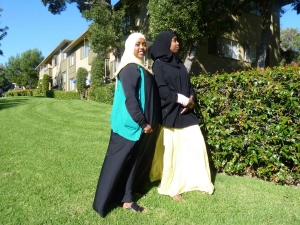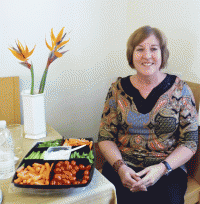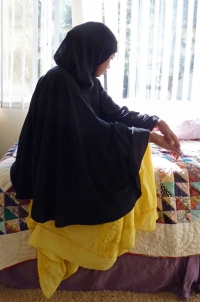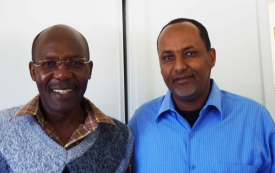By Miriam Raftery
 “We want you to have a good start in America, and for the rest of your lives.” – Dory Beatrice, president of La Jolla Golden Triangle Rotary Club, speaking to Somali women at Project Refuge
“We want you to have a good start in America, and for the rest of your lives.” – Dory Beatrice, president of La Jolla Golden Triangle Rotary Club, speaking to Somali women at Project Refuge
February 17, 2011 (San Diego) – Dory Beatrice felt shocked to learn that people who fled persecution and have been granted asylum in America are being released on the streets of San Diego with no funds, no information on resources, and no place to go.
So she worked with local Rotary chapters to raise funds and open Project Refuge, a transitional housing program in partnership with Somali Family Services that now assists asylees who have no family or friends here to help them.
Project Refuge's pilot program provides three months of safe, clean housing for four men and four women in the College area. The program also provides mentors and teachers to help the refugees learn skills to become independent in America.
 “I got involved working with Survivors of Torture for a number of years,” Beatrice told East County Magazine in an interview conducted in January at the Project Refuge housing near SDSU. “Our Rotary club, La Jolla Golden Triangle, has been very active in the international service area.” For example, the club has previously sponsored a Somali sewing center in San Diego to help women learn how to make items to sell. So the club began raising money for Project Refuge, forming a partnership that now includes seven different Rotary clubs.
“I got involved working with Survivors of Torture for a number of years,” Beatrice told East County Magazine in an interview conducted in January at the Project Refuge housing near SDSU. “Our Rotary club, La Jolla Golden Triangle, has been very active in the international service area.” For example, the club has previously sponsored a Somali sewing center in San Diego to help women learn how to make items to sell. So the club began raising money for Project Refuge, forming a partnership that now includes seven different Rotary clubs.
Since 9/11, people seeking asylum in America are routinely thrown into maximum-security detention centers under the jurisdiction of Homeland Security for months or even years while their asylum case works its way through the courts. The asylees at Project Refuge are all Somalis and East Africans who were granted asylum after being detained for a minimum of nine months at an Otay Mesa detention facility operated by Corrections Corporations of America (CCA). They came to America hoping for a better life than their war-torn homeland.
“CCA is a privately run, for-profit prisons corporation. The more people they have, the more time they have, the more money they make,” said Ahmed Sahid, chief executive officer of Somali Family Services. “The asylees are put in with criminals.”
 Both Beatrice and Sahid said that once asylum is granted, the asylees are released under conditions that put them at risk.
Both Beatrice and Sahid said that once asylum is granted, the asylees are released under conditions that put them at risk.
“They are usually released at night, downtown or near San Ysidro, so CCA gets paid for another day,” said Beatrice.
Sahid said the asylees are not given any written information on who to call for help. “They don’t even allow us to distribute literature,” he said.
Instead, asylees must rely on the kindness of strangers who find them on the streets and take them into their homes, or direct them to places to get help. But sometimes, those strangers prey upon vulnerable newcomers.
“I get a call, they say someone is on the streets, just released,” he said of one recent incident. “It took me two hours to find him. This happens often times. It could be the middle of the night.”
Another man, imprisoned for 18 months, was found by a taxi driver on the streets. The driver told him about Somali Family services, which helped him find temporary housing with a Somali family, said Ayan Mohamed with Somali Family Services.
“All the time Ahmed gets crisis calls,” she said. “We do have people in our community who are helping them, but refugee families are already struggling with a lot of people in one apartment. “ San diego has about 15,000 Somalis, Mohamed estimated.
Lorette Nelms Reyes, an immigration attorney, agreed that lives are being put at risk. “They are the most vulnerable people you could find,” she said, adding that many have already suffered abuse and torture where they came from. “Even before they reach our border, they have had an unbelievable journey through Africa, sometimes walking through crocodile infested waters.” The trip to America may entail walking, swimming, stowing away in cargo holds, smuggled in trucks, and traveling on planes to the Mideast, Europe, and South America, including traveling through the Amazon jungle.
ECM has repeatedly sought comment from CCA and Homeland Security on whether the treatment of newly released asylees described above is acceptable to their organizations, or even legal. CCA has refused to comment. Homeland Security responded to only four of 16 questions submitted in writing on February 3rd, providing only links to statistics. Calls and e-mails to Congressman Bob Filner's office requesting his comments on the treatment of newly released asylees have also thus far gone unanswered.
For some asylees, however, the worst ordeal may occur after they are released from CCA’s detention center onto the streets of San Diego.
“What happens, especially to girls, they have to find a place to stay and often they have to pay in kind.” That means sexual services in exchange for food and shelter, Reyes confirmed. “This is what outrages me…Some prefer to sleep in the park, in bushes, to get away.”
The situation in San Diego was so bad, said immigration attorney Cheri Attix, that “I actually had one Somali client who was homeless and asked to go back in detention. They refused.”
Rotary’s Project Refuge is a “unique model” that helps keep those granted asylum off the streets. Beatrice knows of only two other transitional housing projects for asylees exist in the U.S., and both are church-based (in Minnesota and the East Coast.) Rotary clubs raised the money to lease apartments in a safe neighborhood, bringing in the first asylees—four men and four women--on September 1st, 2010.
The apartments are clean and well-lit, with kitchens and shared bedrooms, large windows, trees, a spacious lawn, swimming pool, community room with computers, and other amenities.
“We’re not looking to give them everything, but to teach them how to be independent,” Beatrice explained. “We provide mentors, one-on-one relationships.” Mentors show the asylees around the city and teach them new skills.
Beatrice said that CCA has told her that they teach English to detainees. But she said, “These people all say they don’t.”
Teachers provided by Rotary instruct the eager students in English, cooking, cleaning, and home repair. “They have no idea how to shop…A first trip to an American supermarket can be pretty overwhelming,” Beatrice said. “They are not familiar with our materials. They’re all going, `how do we clean these floors?’ The men didn’t do cooking or cleaning in Somalia, but now they need to be independent.” 
During an open house in January, Erik Kimani with Rotary Club of Nairobi North in Kenya paid a visit to welcome the new arrivals. “I have many friends who are Somali,” he told them. “We hope you will be good ambassadors for Africa.”
Guests were served up Somali foods such as sambusos—a pastry filled with chicken or potato.
Asylees are allowed to stay for three months at Project Refuge housing. Surprisingly, Beatrice said, “It turns out that most are going to Minnesota, Denver, and Nebraska” where there are also large Somali populations. So Rotary launched a warm clothing drive for those moving on.
Most Somalis are Muslim and face added scrutiny to win asylum because of a handful of Somali immigrants who have been linked to terrorism. Yet those seeking asylum have, ironically, faced persecution at the hands of Muslim extremists in their native lands. “Many of these asylees were attacked by Al Shabaab. Al Shabaab will break in, take the sons—they have guns—and beat any who object,” said Beatrice. “They are fleeing Al Shabaab. They are not supportive.”
Reyes praised Project Refuge and said it’s very important to raise public awareness about their situations. “People see refugees and asylees and have no idea how they came here and what they can provide to the community,” she said. “Most are very hard working in menial jobs as taxi drivers or store clerks. Welfare is the exception, not the rule.” Those exceptions are mainly women with children whose husbands were killed, she added. “Most are genuinely happy to be here. They have community to support, but also don’t live in fear anymore of being killed, raped, or attacked.”
Still, there are needs as yet unmet. Many asylees are survivors of torture. But only those who suffered state-sponsored torture are eligible for counseling services. “Most of these people can’t qualify for ay government programs, but they need help,” she said.
Overall, 51% of all asylum requests made in the U.S. last year were granted. But who succeeds depends largely on who gets access to services while in detention. “If asylees in prison get lawyers and psychological evaluations, they are 98% successful at getting asylum. If not, only 7% win asylum.” Those denied asylum are deported, usually back to the homelands from which they fled, though sometimes to a third country.
Those who were fortunate enough to win asylum and be accepted into Project Refuge had an opportunity to meet with donors such as Maria Walker, a retired world traveler who helped make Project Refuge a reality, during January’s open house.
“I am wonderfully impressed by how nice the apartments are and how happy they are,” she said, after meeting the asylees granted shelter here.
Sawda Ugas, a translator who came here as a refugee herself, facilitated communication between visitors and women who found a safe haven here after risking their lives to escape their homelands. (Read East County Magazine’s exclusive interviews with several Somali asylees here.)
Benefactors hope Project Refuge may serve as a national model for helping people granted asylum in America become self-sufficient in a safe, nurturing environment.
“We want you to have a good start in America and for the rest of your lives,” Beatrice told the women.
“Insha'Allah (God willing),” one replied in Arabic.
Another, tears of joy gleaming in her eyes, thanked Walker and Beatrice for their help, then added, “I’ll never forget how the community did this.”







Comments
life as a muslim refugee
I commented on the previous article but find the need to re-reply here as well.
I find it odd that this woman would come to a free country like the U.S.A. and still wear the religious dress of an oppressive religion that enslaves women, mutilates their genitalia, subjugates them to second class citizens, would not allow them the right to drive, would not be appalled to have to live with a second or third wife, be required to have her parents "decide" who she will or will not marry, would "under sharia law" say that if 4 men agreed that she was a "whore" because she was nothing more than being in the presence of an unmarried male could be stoned to death. Oh did I mention it is a religion of peace? I do not deny her the desire to have a better life, but to "choose" to come to a country that is truly free and but make a conscience decision to still be oppressed just baffles me.
Danny
Danny - Many religions have
Danny - Many religions have oppressed people, particularly woman, down through the ages. But people tend to pick and choose within their own religion, ignoring the bad and holding on to the elements that bring them comfort. One might argue that Catholocism is oppressive, prohibiting birth control and divorce, for example, and the Church has covered up abuse by priests, yet millions, probably billions of people are still Catholics. I would imagine that moving to a foreign land all by yourself is pretty traumatic; holding on to one's religious belief may provide some sense of stability when everything else in life is changing.
As for genital mutiliation, I believe that's a regional tribal practice, not a practice of Islam. I've never heard of that done outside of certain areas in Africa or among some African immigrants. I'm not sure if Somalia is an area where that's done or not. Finally, many Muslims don't believe in Sharia law. Islam like many religions has its extremists and fundamentalists, but there are others who have peaceful views. Do Christians abandon Christianity because there are some extremist ministers preaching hate or racist views? I think most people look for what they believe is good about their faith and its religious teachings, and disapprove of those who tarnish that, but usually don't abandon that faith.
This is a very great project!
This is a very great project! I hope this will be successful!